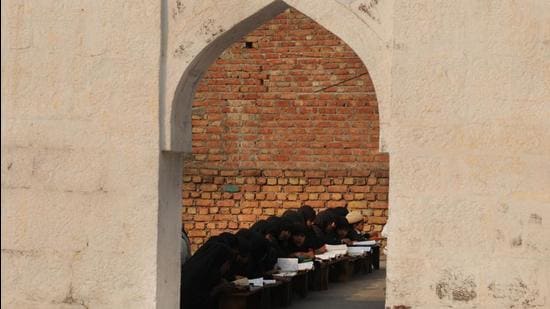The significant limitations of Urdu medium schooling
Though Muslims have the lowest enrolment rates than any other Indian group at all levels of school and higher education—lower than SCs and STs—the focus should be on the poor and lower middle class among them, comprising about 80% of India’s Muslims
In keeping with the Sustainable Development Goal (SDG 4), the 2020 National Education Policy (NEP) recommended that all Indian children should receive 15 years of quality schooling. Implementing this goal for poor and lower middle class Muslim students should be the topmost priority in any agenda of educational reform for Indian Muslims.

Though Muslims have the lowest enrolment rates than any other Indian group at all levels of school and higher education—lower than SCs and STs—the focus should be on the poor and lower middle class among them, comprising about 80% of India’s Muslims. These disadvantaged Muslims have the lowest school completion rates in India—many do not proceed beyond Class 8 and many drop out much earlier.
While Muslims attend English, regional language and Urdu medium schools, the expansion and reform of the latter has dominated most post-independence discussions of Muslim educational reform.
Also Read | Awards in limbo as UP’s Urdu Akademi awaits new chairperson
This preoccupation—mainly of the middle class and elite Muslims—is beset with contradictions because almost the entire student body of Urdu medium schools has been poor and lower middle class for decades. Their wealthier co-religionists moved away from these schools many moons ago.
Therefore, in the light of the 2020 NEP goal, the fundamental and unavoidable question to be answered now is whether Urdu medium schooling can be reformed to provide 15 years of quality schooling for disadvantaged Muslims that study in them, and also serve their material and developmental interests.
Despite the strong historical and cultural bonds that Urdu has among Muslims, and many efforts by government and Muslim organisations to promote Urdu and Urdu medium instruction, both continue to decline. In the 2011 Census, Urdu speakers constituted only 4.2% of the Indian population, and therefore only about 30% of Indian Muslims declared Urdu as their first language.
According to the 75th NSS Round of the 2017-18 Household Survey on Education, only 12.2 % of Urdu speaking households sent their children to Urdu medium schools, and larger numbers to Hindi medium (13.2%) and regional medium schools (20.8%). The majority of Urdu-speaking households (53.8%) sent their children to English medium schools. Among India’s 12 major languages, Urdu speakers ranked lowest among those who sent their children to schools teaching in the same medium of instruction as their home language.
Moreover, U-DISE 2015-16 data revealed that Urdu medium school enrolment accounted for only a minuscule 2% of total student enrolment in different mediums of instruction. The corresponding figure for Maharashtra was 6.7%—the state with the largest number of Urdu medium schools.
Various studies in Maharashtra and Karnataka have also documented the poor quality of instruction and learning in Urdu medium schools. Limited available educational resources in Urdu cannot currently make it an instrument for developing basic scientific knowledge, nor access to most of the knowledge available on the internet.
Few Urdu medium schools have Class 10 or Class 12 sections. This has limited the future of many young vulnerable Muslim students and ruled out attractive vocational training options—like the national network of Industrial Training Institutes (ITIs) and polytechnics—which impart skills in many occupations. Both require Class 10 and Class 12 certificates as minimum entry requirements.
Urdu medium instruction has not equipped students to compete for government and private sector employment. Career options are mainly limited to teaching in Urdu medium schools and madrasas. It is linguistic skills in regional languages and English, and not Urdu that help Muslims deal with civic issues and practical daily concerns, and to understand the main local, regional and national cultural trends. This incapacity, as the veteran journalist Maqbool Siraj has highlighted, deters the community’s effective integration with mainstream life and development, and also hinders its access to positions of power, profit and privilege which lends assertiveness to them.
Urdu medium schooling cannot provide disadvantaged Muslims with 15 years of quality school education, and therefore cannot be part of a transformative education agenda that will help Muslims climb out of their current socio-political and developmental morass. This vulnerable group continues to send their children to government regional medium schools, but since the 1990s have opted overwhelmingly for private low-cost English medium schools. The preservation of Urdu as a living vibrant language needs to be re-imagined without depending on promoting it as a medium of instruction, among its shrinking and reluctant base of disadvantaged Muslims.
Any agenda of educational reform for them must significantly improve learning skills in general, and English skills in particular in these government and private unaided schools. At present, both are rote learning factories and impart significantly substandard skills. The cruellest irony is that many poor Muslim parents make considerable sacrifices to send their children to these private low-cost English teaching shops, and are unaware that their children’s futures in education and employment will continue to stagnate.
John Kurrien has been working in the field of the education of disadvantaged groups for four decades
The views expressed are personal
Get latest news onEducation along with updates on Board Exams and Competitive Exams at Hindustan Times. Also get latest Job updates on Employment News.









